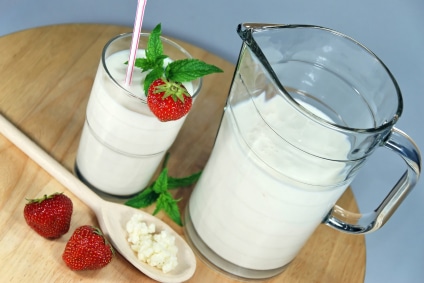 Good bacteria called probiotics have been in the spotlight recently for their role in keeping intestines healthy and boosting immunity. These friendly bacteria found in foods such as yogurt with active cultures and fermented foods such as miso and tempeh are the focus of research to see what role they play in treating intestinal problems and preventing certain diseases. They may also help keep yeast in check, thereby lowering the risk of vaginal yeast infections.
Good bacteria called probiotics have been in the spotlight recently for their role in keeping intestines healthy and boosting immunity. These friendly bacteria found in foods such as yogurt with active cultures and fermented foods such as miso and tempeh are the focus of research to see what role they play in treating intestinal problems and preventing certain diseases. They may also help keep yeast in check, thereby lowering the risk of vaginal yeast infections.
Probiotics for Weight Loss?
Could probiotics play a role in treating obesity too? Research has already found that obese people and people who are of normal weight have different bacterial populations in their intestines. Even more interesting is the fact that when obese people lose weight, the population of bacteria in their gut changes to resemble those of a normal weight person. There’s also some evidence the type of bacteria you carry in your gut can affect your appetite and how much food you eat.
Having the right balance of bacteria in your gut may also help to ward off metabolic syndrome, a common condition that increases the risk of type 2 diabetes and heart disease. Diabetic mice that were given certain strains of probiotics showed significant improvements in their blood sugar levels and a drop in their fasting insulin levels. This bodes well for metabolic health and for body weight since high levels of insulin are linked with increased storage of body fat. Obesity and metabolic syndrome are two conditions that are closely linked.
Probiotics Help Women Lose Weight After Pregnancy
In another study carried out in Finland, women who took probiotic supplements during the first trimester of pregnancy had an easier time shedding their post-pregnancy body fat than women that took a placebo. A year later, they had a lower body fat percentage and less body fat than women who didn’t take probiotics.
With such limited research, it’s not clear whether taking a probiotic supplement helps with weight loss, although it’s an intriguing concept. Regardless, maintaining a healthy population of “good bacteria” in your intestines bodes well for overall health. Having the proper balance of bacteria in your intestines helps to keep disease-causing bacteria and viruses at bay. In children, a study showed that supplementation with probiotic bacteria reduced the incidence of colds and missed days from school. Such is the power of probiotics on the immune system.
How to Keep Your Gut Healthy and Maybe Lose Weight at the Same Time
In general, eating a diet heavy in processed foods destroys good bacteria and makes it easier for the bad ones to flourish. Start by eliminating processed food and eating more fresh fruits and vegetables. You can get probiotics through diet by eating yogurt with active cultures and some fermented foods such as kefir, tempeh, kimchi, and miso.
What about probiotic supplements? They appear to be safe for most people, although you shouldn’t take them without consulting your doctor, especially if you have an immune deficiency disease or other serious health problem.
A good probiotic supplement should contain at least a billion bacteria per gram. Look for one that’s enteric-coated so the bacteria won’t be destroyed by stomach acid before they can reach your intestines. Buy from a reputable manufacturer, and keep probiotic supplements away from heat.
The Bottom Line?
Gut bacteria may play a role in weight control, although more research is needed to confirm this. In the meantime, add more friendly bacteria to your intestinal tract by eating fewer processed foods and more yogurt with active cultures and fermented food. You’ll be doing good things for your health.
References:
Nutraingredients website. “Probiotics Could Benefit Metabolic Syndrome”
Nutraingredinets website. “Probiotics May Help Women Regain Their Figure After Pregnancy”
Mercola website. “Probiotics Benefit Metabolic Syndrome Patients”
Related Articles By Cathe:
Can Probiotics Help with Exercise Recovery?
Are Probiotic Supplements Overhyped?
The Problem with Probiotic Supplements: Are They What They Seem to Be?
Fermented Foods vs. Probiotic Supplements: Is One Better Than the Other?
Work Out Hard? Here Are 3 Reasons Why You Need More Probiotics in Your Diet
Probiotics: Can Friendly Bacteria Help You Lose Weight?
Top 4 Reasons to Cultivate Healthy Gut Bacteria
How Your Gut Microbiome Changes with Age and How It Impacts Your Health

